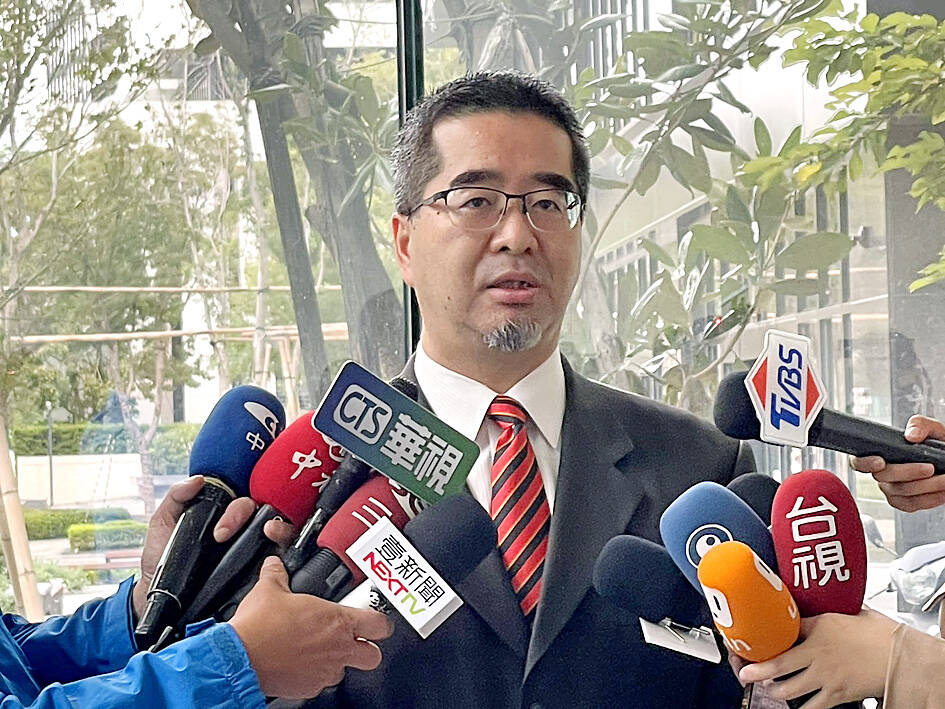President William Lai (賴清德) should backpedal from his new “two-state theory” and return to the “one China” principle in line with the Republic of China (ROC) Constitution, to foster and rebuild mutual trust across the Taiwan Strait, Ma Ying-jeou Foundation director Hsiao Hsu-tsen (蕭旭岑) said yesterday.
Hsiao made the remark after the Chinese government on Friday revealed guidelines saying that its courts, prosecutors, and public and state security bodies should “severely punish Taiwanese independence diehards for splitting the country and inciting secession crimes by the law, and resolutely defend national sovereignty, unity and territorial integrity.”
The Democratic Progressive Party’s “kneejerk” reaction every time China adopts a tougher stance is to criticize Beijing, Hsiao said.

Photo: Lin Hsin-ying, Taipei Time
“This is not conducive to de-escalating cross-strait tension,” he said.
Lai must explain why China did not make such moves under the administrations of former presidents Ma Ying-jeou (馬英九) and Tsai Ing-wen (蔡英文), Hsiao said.
The increased cross-strait tension under Lai compared with ties under the Tsai and Ma administrations showed that Lai’s independence leanings are unpropitiously affecting cross-strait relations, he said.
The spike in cross-strait tension was due to Lai’s “unconstitutional statements regarding the new ‘two-state theory,’” Hsiao said, adding that the statements were regrettable.
The Lai administration’s seeming determination not to back down resulted in China’s statements on Friday, Hsiao said, adding that Taiwan should back away from the confrontational and radical rhetoric, which would benefit the public.
For true peace across the Taiwan Strait to be realized, one must demonstrate integrity by following the Constitution and adhering to the “1992 consensus,” which formed the foundation of cross-strait policies under former presidents Lee Teng-hui (李登輝) and Ma, he said.
The so-called “1992 consensus” refers to a tacit understanding between the KMT and the Chinese Communist Party (CCP) that both sides of the Strait acknowledge there is “one China,” with each side having its own interpretation of what “China” means.
Referring to Chinese Ministry of Public Security official Sun Ping’s (孫萍) remarks that the guidelines “do not target most Taiwanese compatriots, only an extremely small minority” of independence advocates, Hsiao said that private interactions across the strait would continue.
The Ma Ying-jeou Foundation would continue to foster cross-strait youth events in the hope of laying a solid foundation to build mutual trust, he said.
Separately, Chinese Nationalist Party (KMT) Chairman Eric Chu (朱立倫) reiterated that China has no judicial control over the ROC.
However, both sides should exercise restraint lest hostilities spiral out of control, Chu said.
Lai should “relax,” as over the past month, his party has attacked and opposed the KMT instead of engaging in dialogue, Chu said.

Chinese spouse and influencer Guan Guan’s (關關) residency permit has been revoked for repeatedly posting pro-China videos that threaten national security, the National Immigration Agency confirmed today. Guan Guan has said many controversial statements in her videos posted to Douyin (抖音), including “the red flag will soon be painted all over Taiwan” and “Taiwan is an inseparable part of China,” and expressing hope for expedited reunification. The agency last year received multiple reports alleging that Guan Guan had advocated for armed reunification. After verifying the reports, the agency last month issued a notice requiring her to appear and explain her actions. Guan

GIVE AND TAKE: Blood demand continues to rise each year, while fewer young donors are available due to the nation’s falling birthrate, a doctor said Blood donors can redeem points earned from donations to obtain limited edition Formosan black bear travel mugs, the Kaohsiung Blood Center said yesterday, as it announced a goal of stocking 20,000 units of blood prior to the Lunar New Year. The last month of the lunar year is National Blood Donation Month, when local centers seek to stockpile blood for use during the Lunar New Year holiday. The blood demand in southern Taiwan — including Tainan and Kaohsiung, as well as Chiayi, Pingtung, Penghu and Taitung counties — is about 2,000 units per day, the center said. The donation campaign aims to boost

The Kaohsiung Tourism Bureau audited six hotels in an effort to prevent price gouging ahead of Korean band BTS’ concert tour in the city scheduled for Nov. 19, 21 and 22 this year. The bureau on Friday said that the audits — conducted in response to allegations of unfair pricing posted on social media — found no wrongdoing. These establishments included the local branches of Chateau de Chine, Hotel Nikko, My Humble House, and Grand Hai Lai, it said, adding that the Consumer Protection Commission would have penalized price gougers had the accusations been substantiated. The bureau said the Tourism Development Act

BACK TO WINTER: A strong continental cold air mass would move south on Tuesday next week, bringing colder temperatures to northern and central Taiwan A tropical depression east of the Philippines could soon be upgraded to be the first tropical storm of this year, the Central Weather Administration (CWA) said yesterday, adding that the next cold air mass is forecast to arrive on Monday next week. CWA forecaster Cheng Jie-ren (鄭傑仁) said the first tropical depression of this year is over waters east of the Philippines, about 1,867km southeast of Oluanpi (鵝鑾鼻), and could strengthen into Tropical Storm Nokaen by early today. The system is moving slowly from northwest to north, and is expected to remain east of the Philippines with little chance of affecting Taiwan,